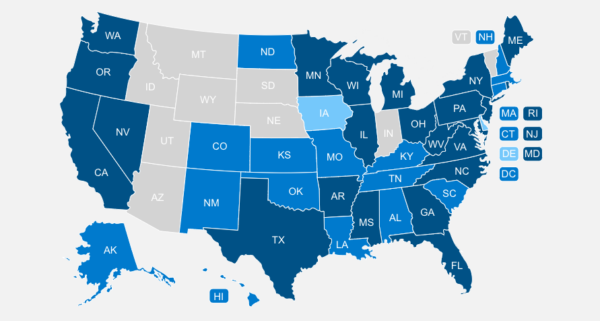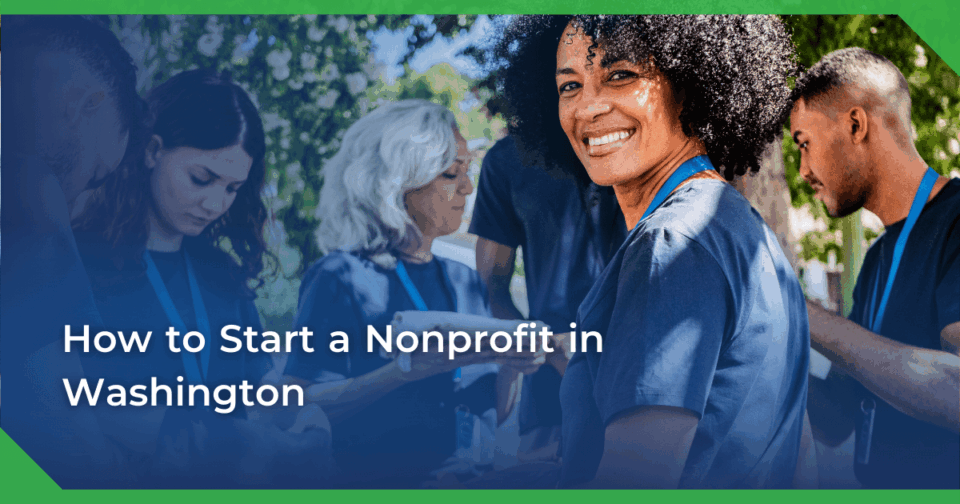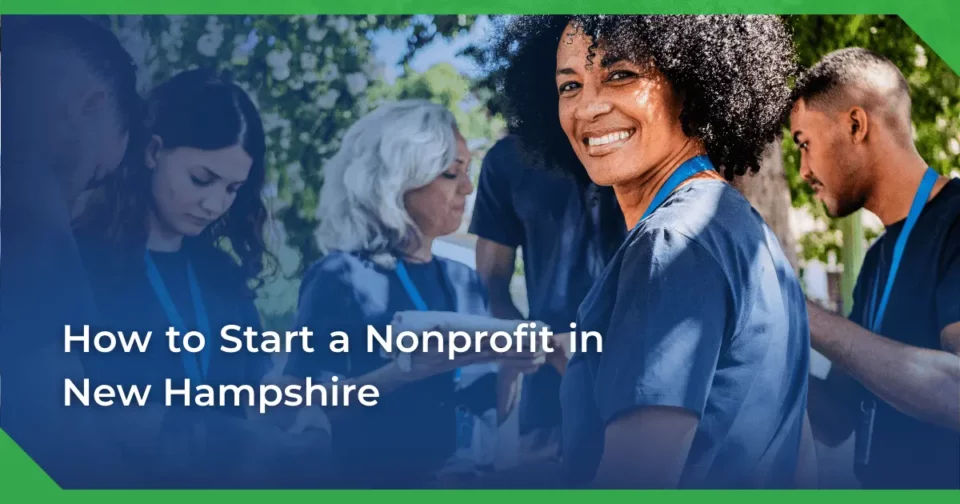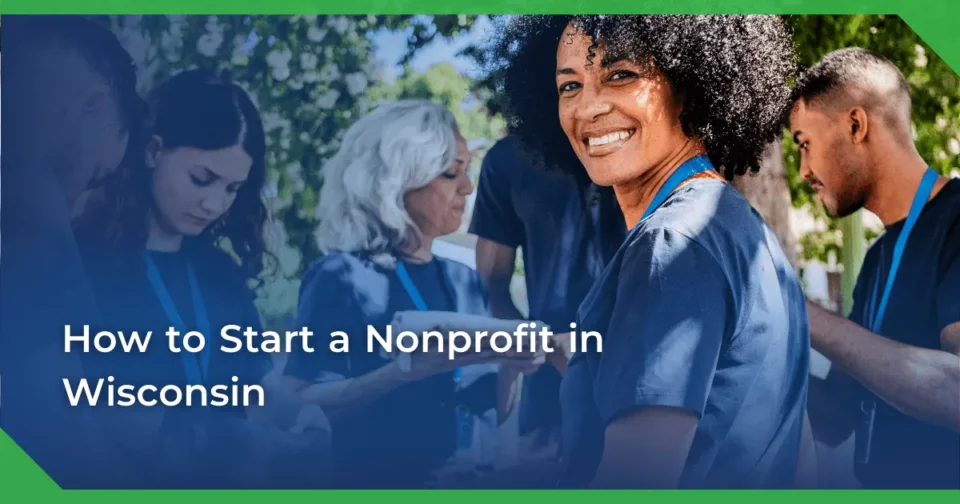
How to Start a Nonprofit in New Mexico: A Beginner’s Step-by-Step Guide
August 26, 2025
How to Start a Nonprofit in Oregon: A Simple Guide With All Legal Forms
August 26, 2025How to Start a Nonprofit in North Carolina: A Step-by-Step Guide

Did you know that North Carolina is home to over 40,000 nonprofits, contributing more than $51 billion to the state’s economy?
Whether you’re passionate about education, healthcare, environmental conservation, or community development, starting a nonprofit in North Carolina can turn your vision into reality. However, the process might seem overwhelming at first – from filing legal documents to building your leadership team.
In fact, many aspiring nonprofit founders get stuck navigating the complex requirements and paperwork. That’s why working with Labyrinth’s nonprofit formation services can make nonprofit compliance easy and your journey smoother. With our 100% IRS approval guarantee and dedicated Nonprofit Compliance Specialists who have 15+ years of nonprofit leadership experience, you’ll have expert guidance through every step of the formation process.
Ready to make a difference in your community? This comprehensive guide will walk you through every step of starting your nonprofit in North Carolina, from planning your mission to securing tax exemptions. Let’s transform your charitable vision into action!
Planning Your North Carolina Nonprofit
Before diving into the legal paperwork, thoughtful planning sets the foundation for your North Carolina nonprofit’s success. A well-structured approach ensures your organization meets community needs effectively while maintaining financial stability.
Identifying Your Mission and Purpose
Your mission statement forms the core of your nonprofit, guiding every decision and action. A compelling mission statement should clearly outline what you do, whom you serve, and your intended impact. Additionally, your statement needs to be concise, using precise everyday language while avoiding ambiguity or hyperbole.
When crafting your mission, consider these essential elements:
- Define specific charitable, religious, educational, scientific, or literary purposes you aim to achieve
- Focus on addressing unmet needs in your community
- Ensure your goals align with public benefit requirements
- Create measurable objectives to track progress
Researching Similar Organizations
Understanding your nonprofit’s ecosystem helps clarify your unique position and impact potential. Nearly half of nonprofit sector revenue comes from private fees for services, while one-third derives from government grants and contracts. This knowledge shapes your strategic positioning.
Start by identifying 4-5 organizations that:
- Provide similar services to comparable stakeholders
- Operate with a similar model
- Share your geographic focus
- Target similar funding sources
Examine their websites, social media presence, annual reports, and Form 990s to understand their:
- Core activities and programs
- Target audiences
- Funding sources
- Marketing strategies
- Unique value propositions
This analysis helps you identify gaps in services and opportunities for collaboration rather than competition. For professional guidance through this process, consider working with Labyrinth’s nonprofit formation experts who can provide 1-on-1 support from specialists with extensive nonprofit leadership experience.
Creating a Basic Budget Plan
Sound financial planning ensures your nonprofit’s sustainability. Your budget serves as a framework for managing revenue and expenses throughout the year. Begin by categorizing your projected income sources:
- Private fees for services
- Government grants and contracts
- Individual and corporate contributions (which typically account for about 5% of funding)
Next, outline your expenses across three main categories:
- Program Services
- Management and General Operations
- Fundraising Activities
Remember that North Carolina has 11,800 organizations operating as 501(c)(3) nonprofits with annual revenues exceeding $50,000. Therefore, create realistic financial projections based on your organization’s scale and scope.
Your budget should include:
- Monthly and yearly revenue projections
- Detailed expense breakdowns
- Cash flow forecasts
- Financial reserves planning
For enhanced credibility and operational efficiency, partner with Labyrinth’s financial management and compliance services to navigate the complexities of nonprofit financial management and compliance requirements. Our secure nonprofit client portal allows you to track progress and store important documents throughout the formation process.
Monitor your budget regularly and be prepared to make adjustments based on actual performance. This flexibility ensures your organization maintains financial health while working toward its mission. Furthermore, a well-structured budget demonstrates fiscal responsibility to potential donors and grantmakers, increasing your chances of securing sustainable funding.
Choosing Your Nonprofit Structure
Selecting the right legal structure shapes your nonprofit’s future operations and tax benefits. North Carolina offers several organizational options for nonprofits, with the nonprofit corporation being the most common choice.
Types of Nonprofits in NC
The Internal Revenue Code provides 27 different nonprofit designations under section 501(c). Among these, North Carolina hosts 59,048 active tax-exempt organizations, including 50,001 501(c)(3) organizations.
Your nonprofit structure options include:
- Nonprofit Corporation: Created by filing Articles of Incorporation under the North Carolina Nonprofit Corporation Act. This structure offers limited liability protection, meaning members aren’t personally responsible for the organization’s debts or obligations.
- Unincorporated Associations: Suitable for smaller, informal groups without significant assets or employees.
- Charitable Trusts: Ideal for organizations focused primarily on managing and distributing assets for charitable purposes.
- Limited Liability Companies: Less common but possible under specific circumstances.
Professional guidance from experienced Nonprofit Compliance Specialists can help determine the most suitable structure based on your goals, planned activities, and operational needs. With Labyrinth’s end-to-end formation support, we’ll provide personalized recommendations that align with both state requirements and federal tax exemption standards.
Benefits of 501(c)(3) Status
Although various nonprofit designations exist, obtaining 501(c)(3) status offers significant advantages. Organizations qualifying under 501(c)(3) must operate exclusively for charitable, religious, educational, scientific, or literary purposes according to IRS guidelines for 501(c)(3) organizations.
Key benefits include:
Financial Advantages:
- Federal income tax exemption on contributions and operational earnings
- State corporate income tax and franchise tax exemptions per the North Carolina Department of Revenue
- Eligibility for property tax exemptions through N.C.G.S. § 105-282.1 property tax exemptions
- Sales tax reimbursement opportunities
Operational Benefits:
- Discounted postal rates from USPS
- Pro bono services from advertising and law firms
- Reduced rates for radio and television promotions
- Access to exclusive government programs
- Enhanced credibility with donors and stakeholders
Funding Opportunities:
- Tax-deductible donations from supporters
- Eligibility for public and private grants
- Increased appeal to potential donors through tax benefits
Partner with Labyrinth’s 501(c)(3) status support to navigate the complexities of obtaining and maintaining 501(c)(3) status effectively. Our 100% money-back guarantee on IRS tax exemption approval provides confidence as you pursue this crucial designation.
Remember that 501(c)(3) organizations must meet specific requirements:
- Operate exclusively for exempt purposes
- Avoid private benefit to individuals or shareholders
- Follow restrictions on political and legislative activities
Moreover, maintaining compliance involves ongoing responsibilities. Your organization must file annual reports, maintain proper records, and adhere to state and federal regulations to preserve its tax-exempt status. Labyrinth’s secure client portal helps you stay organized with document storage and compliance tracking throughout this journey.
Building Your Leadership Team
A strong leadership team forms the backbone of your nonprofit’s success. Establishing the right governance structure ensures effective decision-making and organizational growth.
Required Roles and Positions
Every North Carolina nonprofit must have specific officer positions to maintain legal compliance. At minimum, your organization needs:
- Board President/Chair: Leads the board in performing duties, presides over meetings, and serves as chief volunteer officer
- Secretary: Maintains meeting minutes, records board actions, and oversees documentation
- Treasurer: Oversees financial affairs and ensures fiscal responsibility
North Carolina allows one person to hold two officer positions simultaneously, except president and secretary must be separate individuals. Beyond these core positions, consider appointing non-voting officers like CEO, CFO, or COO based on your organizational needs.
Professional guidance can help structure your leadership roles effectively, ensuring compliance with both state requirements and IRS standards for tax-exempt organizations.
Finding Board Members
Building a diverse, committed board strengthens your nonprofit’s impact. North Carolina requires only one director, yet having multiple board members brings varied perspectives and expertise. We recommend using three directors to align with IRS standards for 501(c)(3) organizations.
When recruiting board members:
- Define Required Skills: Assess gaps in expertise across:
- Financial management
- Legal knowledge
- Program development
- Community connections
- Fundraising experience
- Consider Diversity: Look beyond professional skills to ensure your board represents:
- The communities you serve
- Different age groups
- Various cultural backgrounds
- Diverse professional sectors
- Evaluate Commitment: Board members must:
- Attend regular meetings
- Exercise independent judgment
- Fulfill fiduciary duties
- Support fundraising initiatives
- Maintain confidentiality
Partner with Labyrinth’s board recruitment guidance to navigate board recruitment effectively. Our experienced specialists can provide guidance on board composition requirements and best practices for governance.
Setting Up Your First Board Meeting
Your initial board meeting establishes your nonprofit’s foundation. During this crucial gathering:
Essential Actions:
- Adopt bylaws and governance policies
- Elect officers
- Authorize bank account operations
- Set meeting schedule
- Document all decisions
Meeting Preparation:
- Distribute board packets containing:
- Meeting agenda
- Draft bylaws
- Policy documents
- Position descriptions
- Financial projections
- Ensure proper documentation by:
- Taking detailed minutes
- Recording all resolutions
- Maintaining attendance records
- Documenting officer appointments
Ongoing Governance:
- Schedule regular board meetings
- Create committees as needed
- Implement board evaluation processes
- Provide orientation for new members
Remember that board members cannot receive compensation for their board duties. Subsequently, establish clear expectations about the volunteer nature of board service while ensuring members understand their legal responsibilities under North Carolina law. Proper documentation of these early meetings becomes essential when applying for tax-exempt status, as the IRS requires evidence of proper governance structures.
Filing State Documents
Filing paperwork marks a crucial milestone in establishing your North Carolina nonprofit. Once you complete these essential documents, your organization gains legal recognition and can proceed with obtaining tax exemptions.
Articles of Incorporation Steps
The Articles of Incorporation officially create your nonprofit under North Carolina law. The filing process requires careful attention to detail since these documents establish your organization’s legal foundation.
To file your Articles of Incorporation:
- Complete Form N-01: Include these mandatory elements:
- Your nonprofit’s official name
- Statement declaring charitable or religious status
- IRS-approved purpose clause for 501(c)(3) qualification
- Initial registered agent’s name and address
- Principal office location and county
- Incorporator details
- Member status declaration
- IRS-approved dissolution clause specifying asset distribution provisions
- Submit Required Fees: Send a $60.00 payment to the North Carolina Secretary of State (919-814-5400, sosnc.gov). Optional expedited processing is available:
- 24-hour service: $100.00
- Same-day service: $200.00 (submit by noon)
- Choose Filing Method: Submit through:
- In-person delivery
- Online submission
Professional assistance ensures your Articles meet both state requirements and IRS standards for tax exemption. Labyrinth’s state filing services can expedite your filing in North Carolina, helping you get approved faster. We draft all necessary documents, ensuring accuracy and compliance from the start.
Getting Your EIN Number
An Employer Identification Number (EIN) functions as your nonprofit’s federal tax ID. This nine-digit number proves essential for various operational tasks. You must obtain your EIN after your state incorporation is approved but before opening bank accounts or filing for tax exemptions.
Key EIN Requirements:
- Mandatory for all organizations, regardless of employee status per IRS guidelines for Employer Identification Numbers
- Must be obtained after legal formation according to IRS requirements
- Required for opening bank accounts and tax filings
Application Methods:
- Online (fastest option):
- Free service through IRS website
- Immediate EIN assignment
- Available during specific hours
- Alternative Methods:
- Fax: 4 business days processing
- Mail: 4-5 weeks processing
- Phone: Available for international applicants
Partner with Labyrinth’s EIN acquisition services to navigate the application process efficiently. Our comprehensive formation services include EIN acquisition, eliminating one more task from your to-do list. Through our secure nonprofit portal, you can track the status of your EIN application alongside all other formation steps.
Important Considerations:
- Apply only after state incorporation approval
- Select “church or church-controlled organization or other nonprofit organization” as entity type
- Maintain accurate records as EIN links permanently to your organization
- Remember EIN differs from state tax-exempt numbers
Upon receiving your EIN, preserve all documentation carefully. Consequently, this number becomes vital for:
- Opening organizational bank accounts
- Processing payroll if hiring employees
- Filing annual Form 990 returns
- Applying for 501(c)(3) status
- Managing state and federal tax obligations
The EIN application process requires no fee. Nevertheless, avoid third-party services charging for EIN acquisition, as direct IRS application remains free. With Labyrinth handling this step as part of our formation package, you can be confident the application is completed correctly without unnecessary fees.
Securing Tax Exemptions
Obtaining tax-exempt status unlocks significant financial benefits for your North Carolina nonprofit. The process involves securing exemptions at both federal and state levels, along with understanding sales tax obligations. Remember that forming your nonprofit corporation alone does not automatically grant tax exemptions—you must apply separately to the IRS for federal tax-exempt status.
Federal Tax Exemption Process
The journey toward federal tax exemption begins with Form 1023, a comprehensive application for 501(c)(3) status. The standard form spans approximately 30 pages, often expanding to 100 pages with required attachments. Smaller organizations might qualify for Form 1023-EZ if their gross receipts are under $50,000 and total assets remain below $250,000.
Essential application components:
- Detailed organizational structure
- Governance documentation
- Program descriptions
- Financial projections
Labyrinth’s Form 1023/1023-EZ services streamlines this complex process, ensuring accurate submission. We manage everything from drafting your Form 1023 or 1023-EZ to responding to any IRS correspondence during the review process. With our 100% IRS approval guarantee and transparent pricing with no hidden fees, you can proceed confidently knowing your application is in expert hands.
Processing timelines vary:
- Form 1023: 3-18 months
- Form 1023-EZ: 2-4 weeks
Upon approval, your organization receives a determination letter confirming tax-exempt status from the IRS. This status exempts your nonprofit from federal income tax on most revenue types, except unrelated business income, as per federal income tax guidelines. Only after receiving this determination letter will donations to your organization become tax-deductible for donors. Labyrinth’s secure client portal allows you to track your application status in real-time and store your determination letter safely once received.
NC State Tax Requirements
North Carolina offers streamlined tax benefits once you secure federal exemption. Unlike some states, North Carolina requires no separate application fee for state tax exemption according to North Carolina tax guidelines. Instead, the process involves:
- Registering with NC Secretary of State
- Submitting documentation:
- Articles of Incorporation
- Bylaws
- Federal Determination Letter
Professional guidance ensures compliance with state requirements. Labyrinth’s comprehensive formation support includes managing both federal and state tax exemption processes, coordinating submissions to ensure nothing falls through the cracks.
State-level benefits include:
- Corporate income tax exemption
- Franchise tax exemption
- Property tax exemption opportunities through N.C.G.S. § 105-282.1 property tax exemptions
Organizations must maintain proper documentation as North Carolina does not issue “exempt numbers” for franchise and corporate income tax purposes, as stated in a North Carolina Department of Revenue publication. Many nonprofits mistakenly believe they need a state tax-exempt number, but North Carolina recognizes your federal determination letter as sufficient proof of exemption.
Sales Tax Considerations
Understanding sales tax obligations proves crucial for North Carolina nonprofits. Initially, your organization must pay applicable sales tax on purchases. Yet, qualified nonprofits can seek reimbursement through these methods:
Purchase Requirements:
- Pay tax at time of purchase
- Maintain detailed records
- Submit semiannual refund requests
Retail Sales Guidelines:
- Register with North Carolina Department of Revenue (877-252-3052, ncdor.gov) if conducting retail sales
- Collect appropriate sales tax
- File regular returns
Specific exemptions exist for:
- Items purchased for resale
- Certain educational events
- Select fundraising activities
For retail transactions, nonprofits must:
- Obtain Certificate of Registration
- File sales tax returns
- Remit collected taxes
- Maintain proper documentation
Organizations making purchases from out-of-state vendors without sales tax collection must register separately and remit use tax. This requirement ensures fair tax treatment across all procurement channels.
Remember that maintaining tax-exempt status requires ongoing compliance. Annual filing requirements include Form 990 submission, due by the 15th day of the fifth month after your fiscal year ends. Failure to file for three consecutive years results in automatic revocation of tax-exempt status. For organizations that have lost their tax-exempt status, Labyrinth’s reinstatement support services, helping you navigate the complex process of regaining your 501(c)(3) designation.
Additionally, charitable registration for fundraising represents a separate requirement from tax exemption. North Carolina requires nonprofits soliciting donations to register with the Secretary of State’s Charitable Solicitation Licensing Division before beginning fundraising activities.
Conclusion
Starting a nonprofit in North Carolina requires careful planning, proper documentation, and ongoing compliance. Most importantly, each step builds upon the previous one – from defining your mission through securing tax exemptions.
Your success depends on making informed decisions about organizational structure, building a strong leadership team, and maintaining proper documentation. Therefore, partnering with Labyrinth for nonprofit registrations and renewals can help you focus on your mission while navigating complex requirements and avoiding common pitfalls. With Labyrinth’s 100% IRS approval guarantee, SOC 2 Type II certified secure portal, and support from Nonprofit Compliance Specialists with 15+ years of experience, we’ll provide confidence throughout the entire formation journey.
The journey of establishing your nonprofit might seem challenging, but the impact you’ll create in your community makes it worthwhile. Working with professional nonprofit services ensures you follow all necessary steps correctly, from filing state documents to securing tax exemptions. Labyrinth’s bundled services even include first-year fundraising registration, setting your organization up for sustainable growth from day one.
Remember that running a successful nonprofit requires ongoing attention to compliance, governance, and financial management. Your dedication to proper planning and setup now will create a strong foundation for your organization’s future growth and impact.


![Your 501(c)(3) Approval Guaranteed{{ include_custom_fonts({"Museo Sans":["Bold","Bold Italic","Regular","Regular Italic"]}) }}](https://no-cache.hubspot.com/cta/default/560178/interactive-194101957210.png)
![Start Your Nonprofit with Confidence{{ include_custom_fonts({"Museo Sans":["Bold","Bold Italic","Regular","Regular Italic"]}) }}](https://no-cache.hubspot.com/cta/default/560178/interactive-194101957151.png)








